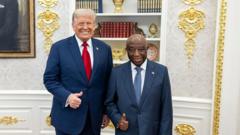In a bold move, President Trump has threatened Brazil with significant tariffs, raising questions on the legality and motives behind such trade measures.
Trump's Trade Power Tested with Threat of Tariffs on Brazil

Trump's Trade Power Tested with Threat of Tariffs on Brazil
President Trump links potential tariffs on Brazilian exports to political maneuvering connected to former president Jair Bolsonaro.
On July 10, 2025, President Trump has once again utilized tariffs as a strategic tool, this time aiming at Brazil in a move that's stirred both political and legal discussions. Citing the ongoing troubles related to Brazil’s former president, Jair Bolsonaro, Trump alleged that the country’s treatment of Bolsonaro warranted consideration of a staggering 50 percent tariff on Brazilian goods set to begin on August 1.
The President has framed his intention around a desire to defend Bolsonaro, who is under scrutiny for alleged attempts to cling to power following a 2022 electoral defeat. Trump described the situation in Brazil as a “Witch Hunt,” suggesting that punitive measures would be imposed unless Brazilian authorities took corrective action regarding Bolsonaro.
This declaration has prompted legal scholars to scrutinize Trump's authority, questioning the ethics and legality of using tariffs as a political weapon. While tariffs are traditionally within the purview of Congress, the President can enact certain duties concerning national security, leading many to wonder if Trump's actions cross the line from economic policy into the realm of political manipulation.
In a previous statement, Trump erroneously claimed that the United States faced a trade deficit with Brazil. However, statistics clarify that American exports to Brazil actually surpass the imports from the South American nation, challenging the foundation of his rationale for the proposed tariffs.
The President has framed his intention around a desire to defend Bolsonaro, who is under scrutiny for alleged attempts to cling to power following a 2022 electoral defeat. Trump described the situation in Brazil as a “Witch Hunt,” suggesting that punitive measures would be imposed unless Brazilian authorities took corrective action regarding Bolsonaro.
This declaration has prompted legal scholars to scrutinize Trump's authority, questioning the ethics and legality of using tariffs as a political weapon. While tariffs are traditionally within the purview of Congress, the President can enact certain duties concerning national security, leading many to wonder if Trump's actions cross the line from economic policy into the realm of political manipulation.
In a previous statement, Trump erroneously claimed that the United States faced a trade deficit with Brazil. However, statistics clarify that American exports to Brazil actually surpass the imports from the South American nation, challenging the foundation of his rationale for the proposed tariffs.





















